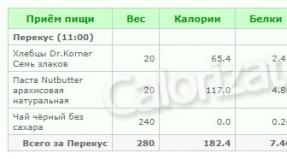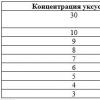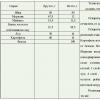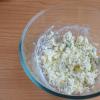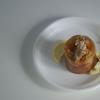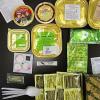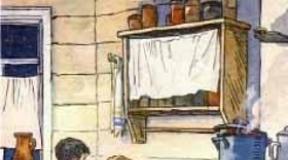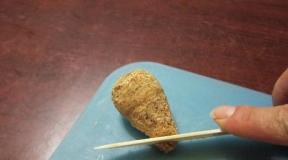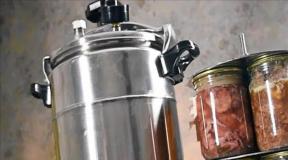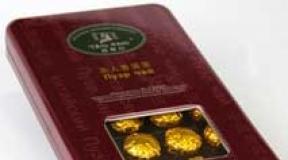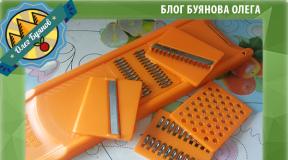Tasting rules and taste characteristics of wines. Cavist and sommelier - who are these people
A wine taster is not a profession for everyone. Why? - you ask. Well, if only because the taster must have a number of both acquired skills and skills inherent in him by nature.
What is so special required of a taster? To begin with, a person engaged in this business must have a high organoleptic sensitivity from birth, that is, to subtly notice the difference between various smells, tastes, must perfectly distinguish colors and even sounds. He must have a good memory for memorizing various parameters of all kinds of noble drink.

In addition to all this, a wine taster must, in the course of his training, compile in his memory a huge knowledge base about tastes, smells, colors of various wines. Must learn how to quickly extract the necessary information from the available knowledge for the fastest and most accurate assessment of the investigated product. The taster must have a good imagination to draw up a more complete picture. Also, for this, he needs to clearly and clearly state his thoughts so that the listener can feel the taste and aroma of wine, even without tasting it.
And where can you learn all this if, for example, you have the ability? A wine taster is such a rare profession in Russia that it can be mastered in a small number of establishments, despite the fact that a wine taster has always been in demand in “our immense”. You can become a taster by undergoing special training at an enterprise that organizes such courses, and after graduation (not the fact that you will graduate) you receive a taster certificate and an invitation to work in the same company.

There is another way - to graduate from a university with a degree in Food Technologist. And if you have all the qualities of a real taster, then, as a specialist, you will not have a price, because you will be able to combine both organoleptic perception and technological knowledge, that is, give advice on the technology of wine production to obtain a better product.
Often people have a simple question: "What is the correct name of the profession of wine taster?" Many people mistakenly believe that a wine taster is, but there are significant differences between them. A sommelier is like a wine waiter. He has to work with a wine list, select a range of wines, recommend wines to customers according to their chosen dishes, and also serve wines according to etiquette. A sommelier is attached to a specific restaurant and cannot be a kind of “freelancer”, unlike a taster. The taster is mainly focused on helping businesses, while the sommelier is focused on helping consumers.

Let's summarize.
A wine taster is a difficult profession, but an interesting and highly paid one. Only a special person can work as a taster.
The tasks of a wine taster include:
- assessment of the state of the proposed wine or wine material;
- analysis of flavoring and aromatic components of the product;
- comparison of the taste and aroma of wine with the standards stored in the memory of the taster;
- it is not necessary, but it is desirable to indicate the possible cost of the wine, based on analogues;
- give advice on the production technology and aging of a particular product.
On one of the forums where I communicate from time to time, I was asked a question that I myself, frankly, never asked: "Could you tell us about the difference between a taster, sommelier, cavist and wine critic?"I didn’t ask because the answer seemed intuitive to me. But let's try to clarify this issue.
People of all listed professions work with wine and are to a certain extent similar, and at a high level they are generally not very distinguishable from each other. Nevertheless, the essential differences between them are: the main professional activity, the most important area of \u200b\u200bexpertise and the employer.
Let's start with sommelieras with the most popular and well-known term. Usually they refer to the employee of the restaurant with a wine list, who is responsible for the selection of the assortment of wines, recommending them to the client and serving them according to etiquette. In fact, a sommelier is a specialized wine waiter who may also be assigned some additional functions. There are no “freelancers” sommeliers. Sommelier is restaurant employee and this is important, as we will understand later. The main area of \u200b\u200bknowledge that a sommelier must master impeccably is not so much the wine itself, but wine etiquette, rules for presenting wine to a client, uncorking a bottle, decanting and pouring wine into glasses. Wine tasting skills are necessary for the sommelier, first of all, to determine the defects and diseases of wine, to check the safety of the bottle served to the client. Of course, a high-class sommelier is not limited to this, often accumulating a very significant experience in wine tastings and a fairly extensive general knowledge of wine. However, a novice worker in this profession may well have only the most basic skills.
Unlike the sommelier, cavist it is not at all obliged to be able to properly open a bottle and remove wine from the sediment. Appeared in the lexicon of wine lovers relatively recently, the name of this profession is still not very familiar to the general public. It is customary to call this word specialists working in wine boutiques and large wine departments of large stores, sales consultants with a narrow specialization, versed in wine and other elite alcohol. The unit operated by the cavist is the bottle, not the glass. Cavist is focused on sales, on the formation of a stable customer interest in visiting this boutique, the so-called customer loyalty. The tasting experience for a cavistu is much less fundamental than a sommelier, it is much more important to have a deep knowledge of types of wines sold, countries and regions of production, best years, various ratings and other awards of the wine. Usually, a much more sophisticated customer comes to boutiques than to a store within walking distance, and when choosing a wine and seeking advice from a store employee, the client expects to hear a professional rationale for the recommendation. As in the case of a sommelier, a cavist is a person keen on communicating with a client, it is very important for him to be able to smoothly, clearly and interestingly express his knowledge, evaluate and adapt to the level of the client. Just like a sommelier, a cavist is not a "free shooter", he is a store employee. Often, he also determines or significantly influences the range of wines presented on the shelves.
He does something completely different taster... His working tool is a glass. Its task is to assess the current level of quality, the state of the wine or wine material at the moment, analyze and compare the taste and aroma with the reference ones stored in the memory of the taster. It is the memory for smells and tastes that is its distinguishing feature. The taster does not have to and in most cases does not know the ritual of serving wine in a restaurant and may be ignorant of the prices of certain wines at a certain point in time. His memory does not have to contain data on the type of soil on the right bank of the Garonne or the value of the Juglin temperature index for Frenchhook. But the ability to identify as many wine problems as possible at the earliest stage, on the other hand, is absolutely necessary. The place of work of the taster is either winery (for example, the Campo Viejo winery has a whole staff of its own tasters, constantly monitoring and adjusting the entire production process), or certifying authority wine industry. A high-class specialist of this profession also perfectly knows the patterns of changes in the organoleptic properties of wine during various technological operations, and is also able to give predictions and recommendations on the possible aging of wine in various types of containers. Unlike the two previous professions, a taster can be a freelancer: he arrived, tasted, issued an opinion, moved to another production.
The difference between a taster and wine critic noticeably thinner. It lies mainly in the plane of publicity. A wine critic is essentially an independent expert taster, whose main task is to evaluate the finished result, the wine that goes on sale. A wine critic, in contrast to a taster, is not oriented towards the inside of the process, not towards the winemaker, but towards the buyer. In addition to the glass, his working tool is a pen, fountain pen or keyboard. The critic as a taster evaluates wines, but at the end, he gives not a formal conclusion about the current state of the sample, but an assessment of the level, often a verbal portrait of the taste and aromatic bouquet, the comparative position of this particular wine relative to other wines, both from the same region and in general. The critic lives by publishing books, writing articles about wine, publishing ratings of wines, by conducting master classes and open tastings. The wine critic is always self employed or an employee of a company not directly related to the production of wine, simply because a significant part of the public immediately suspects a “pocket” critic of any particular economy of bias and bias, and therefore ceases to take his opinion into account. A wine critic's assessment is subjective. Even a perfectly healthy wine, made of perfect quality, may not receive the highest rating from the critic, simply because the wine is not rich enough or atypical for the declared grape variety, uncharacteristic for its region and does not show a high level. No matter how much one would like, the critic's work and assessment always bear a certain personal character, a certain style. Therefore, it is very important for the end consumer of wine to determine for himself how much he personally coincides in his tastes and preferences with this or that critic and to make the appropriate amendment when using his recommendations. For their part, critics, in order to reduce the influence of this factor, very many wines are tasted "blindly", that is, they are judged among others, without knowing either names or prices.
The taster is the guarantor of the good quality of the products manufactured by the enterprise.
Each taster works in his own "genre": someone evaluates perfume aromas, someone specializes in tea, someone in tobacco ... He can evaluate both the initial raw material and the finished product.
In winemaking, in the perfumery industry, in enterprises selling blended tea or coffee, the help of a taster is needed both when purchasing raw materials, and when developing a new blend, and already in the production process.
A taster is a person who, by nature, has the ability to distinguish the finest nuances of taste and smell. According to statistics, no more than 15% of people have a natural ability for professional tasting.
You cannot teach sensitivity, but if you have abilities, you can develop them.
Tasters work on this purposefully, practicing distinguishing between smells and tastes.
Shades of taste and smell must not only be distinguished, but also memorized. Most of us distinguish the scent of bird cherry from the scent of a leather briefcase. But bird cherry and lily of the valley are not distinguished by all. For the professional perfume taster, this problem does not exist. He can easily distinguish flowers by smell from them on a hot day after rain.
The more tastes and aromas there are in a taster's "memory card", the more valuable he is as a specialist.
Moreover, he remembers many smells that he has to sort through during one tasting, compares them and can suggest combinations.
The taster's qualifications, sensory memory and sensitivity develop over the years.
This applies to all tasters, including those who evaluate wine, coffee, tea, etc.
For example, an experienced wine taster can taste where and in what year it is made. This skill is not acquired in one year.
Tasting requires a lot of concentration. Nothing should distract - neither unnecessary objects, nor conversations, nor too bright light, nor foreign smells. Moreover, the taster begins to prepare his receptors for tasting ahead of time: he avoids pungent odors, dishes with a sharp taste. Real tasters do not smoke, do not drink strong alcohol that can reduce the sensitivity of receptors, do not use perfume.
However, the taster's task is not only to choose the best. He must analyze each taste and aroma, describe it and classify it, i.e. express feelings through a system of professional concepts. Without this, it is impossible to formulate what the disadvantages or advantages are and why, when blending, it is necessary to combine these types of tea, wine or coffee, and not others.
The taster also focuses on sight, hearing and sometimes touch. For example, evaluating tea leaves, he sniffs them, evaluates them by touch, listens to their rustle. Then he looks closely at the color of the infusion, and only after that he tastes it.
What are the tasters afraid of?
The taster is a living person, like any mortal, he can get sick or, for some reason, lose his sensitivity. Therefore, some specialists insure their abilities in case of loss.
For example, Gennaro Pelizia, chief taster of the British coffee chain Costa coffeetasting raw coffee beans in the workshop before roasting and sending them to retail outlets. In 2009, Gennaro insured his sensitive tongue for £ 10 million. He explained it this way: “Eighteen years of tasting experience allows me to distinguish thousands of aromas of coffee beans. In my work, taste buds and their sensitivity are decisive, allowing you to highlight the flaws in coffee beans. "
The insurance company found this approach to be very reasonable, since "The taste buds of the coffee master are as important as the tenor's vocal cords or the legs of a top model."
But Dave Roberts is the main taster of the coffee company Nestle - In 2011, he insured his nose for 2 million pounds. The fact is that he determines the quality of coffee beans and their place of origin by aroma.
Workplace
Tasters work at factories that produce food, tea, coffee, tobacco, alcohol, and perfumery. Tasters also work in restaurants to determine the quality of the purchased products.
Salary on 02/20/2019
Russia 30,000-40000 rubles
Important qualities
The profession of a taster presupposes a high sensitivity of receptors, primarily taste and smell, a good memory for aromas and tastes.
The ability to concentrate and distribute attention, emotional stability is also important.
Knowledge and skills
The taster needs to know as much as possible about the products he is working with. For example, in order to be able to notice the slightest flaws in wine, a wine taster must understand the grape varieties, know where they grow, the technology of winemaking. He needs to understand how technological operations affect the taste of wine.
At the same time, one must be able to present the research results in a clear form of tasting (organoleptic) definitions.
Where to study to be a taster
Some manufacturers of food, beverage, tobacco, perfume, etc. organize the courses of the tasters themselves.
As a rule, out of many students, only a few successfully complete all stages of training, receive an appropriate diploma and an invitation to work in the company.
Another way to master the profession is to graduate from a university as a technologist in the food, tobacco or perfume industry. In this case, if tasting abilities are present, they can be successfully combined with technological knowledge.
In some countries, the taster must confirm his qualification level by passing a special certification commission.
Why do you never meet a cavist in a restaurant and a sommelier in a wine supermarket? Why might a high-profile wine taster have a permanent employer, but a critic not? Want to know the answers to these questions? Then let's figure it out together.
Sommelier: from cattle driver to wine cellar keeper
Initially, or rather, in the Middle Ages in France, the sommelier was a sommereier. His duties included overseeing the transportation of the owners' luggage, including linen, provisions and wine. At the end of the 17th century, at the royal court, this servant finally turned into a cupbearer (this is how sommelier is translated from French), and his area of \u200b\u200bresponsibility narrowed to the keeper of the wine cellar, who was responsible not only for the safety of drinks, but also the selection of wine for the owners.
A sommelier today is a restaurant employee whose duties include purchasing wine, organizing its proper storage, drawing up a wine list, as well as advising the customers of the institution on the selection of drinks for their chosen dishes, the correct serving of wine and its tasting. That is, calling a sommelier a “wine waiter”, as many do, is not entirely correct, especially considering that becoming a high-class professional in this business is not so easy.
How to become a “keeper of wine”?
To become a representative of this profession, it is necessary to undergo training at a sommelier school, which implies the study of a theoretical base about the history of wine, wine-making regions, the etiquette of its presentation - presentation to the client, rules for uncorking bottles, decantation, etc. As well as obtaining practical skills in the analysis of ingredients bouquet and their interpretation: each separately and all together.
A good sommelier is simply able to determine the quality of the wine, its age, the variety or varieties of grapes used to blend the drink, and sometimes the region of origin by its aroma. Before serving, he conducts a wine tasting in order to make sure that the drink has no acquired defects or defects.
But to get the title of Master of Sommelier, you will need to work in the profession for at least 10 years. The sommelier also has specialized competitions and championships, but experience rather than talent is more important for winning them. Their winners, as a rule, are those whose work experience is 15–20 years.

Is Cavist a Sales Consultant?
If a sommelier is often "simplified" to a wine waiter, then a cavist - to a sales assistant of a wine boutique, which, as you might have guessed, is not entirely true. Yes, the field of professional activity of a cavist is really, first of all, consulting, but it affects a very narrow area and requires expert knowledge.
This specialist should have a brilliant understanding of wine varieties, the characteristics of the regions and countries of production of drinks, the types of soil on which grapes grow, successful or not harvest years, wine ratings, awards and other subtleties. Only if these conditions are met, he will be able to choose a drink for the buyer according to his taste and needs. That is, the goal of a cavist is to gain customer loyalty, transforming him from random to permanent.

Therefore, practical skills, for example, uncorking bottles, decanting and tasting wine are not as fundamental for a cavist as for a sommelier, although they often study according to the same program and in the same educational institutions. In other words, after graduation, their professional paths diverge greatly. Rather, the cavist turns into a connoisseur of the theory of wine, and the sommelier into a practice. However, the main practitioner in this area is not the sommelier, but the taster.
Chief in the wine "kitchen"
Oddly enough, but the taster does not need to know how different is the taste of Pinot Noir, grown in Bordeaux and Burgundy, for example, or Merlot from the same region, but the harvest of 2010 and 2016; he does not need to be able to remove wine from the lees or navigate the prices for elite alcohol. Its tasks are purely practical. What are they?
This specialist evaluates the current taste and aroma characteristics of the finished wine or wine materials for assembling in relation to the reference. And knowledge and storage in memory of reference tastes and smells is the most important of his professional skills. The second important skill of the taster can be called "diagnostics", that is, the identification of deviations of the organoleptic properties of wine from the standard at the earliest possible stage. His area of \u200b\u200bknowledge includes the patterns of changes in the drink depending on technological processes (for example, aging and its duration in oak, clay or steel), and his tasks include forecasting and providing recommendations for their organization.

But in general, all of the above specialists are united not only by wine, but also by the fact that they are all dependent specialists, that is, their field of activity is always work for hire: a sommelier is a restaurant employee, a cavist works in a wine boutique, a taster works in production or in the field of certification. But there is one more representative of the "wine" profession - a critic who must always remain independent. Why?
Free bread, or Who is a wine critic?
In fact, this is the same taster, but working not for the wine producer, but for the consumer. He assesses the state of the drink for compliance with typical indicators for a certain variety, region, aging period, gives a characteristic of the taste and aroma bouquet, and also expresses this assessment not only in a verbal description, but also in points.
But it is precisely his orientation towards the consumer that requires the wine critic not to show sympathy for this or that producer, therefore his “bread” is reports from open tastings, conducting master classes, publishing books and all kinds of publications in blogs, magazines and other media.

At the same time, do not forget that wine critics are people too, which means that their tastes may not always coincide with yours. In general, the main thing in wine is to taste it. We at Aromatny Mir are always ready to offer you the best samples in terms of price-quality ratio. Come and see for yourself.
These people are professionals in their field. They know everything and even more about alcohol. Who are we talking about? Let's figure it out ...
Profession cavist (from the French "cellar caretaker") is relatively new and very few people are familiar with. These are people who are sort of sales consultants or elite alcohol sales managers. The only difference from the latter is that cavists work in a very narrow specialization than sellers, covering almost the entire spectrum of trade. Cavists must undergo special training and, preferably, have a psychological education, as well as be sociable. These qualities are very important in the specifics of their work. After all, cavists are focused not on supermarkets and ordinary stores, but on special wine boutiques, where the most elite products are presented. From this we can conclude about clients and that each one needs an individual approach. Knowledge of the cavist means helping the buyer not only in choosing a product and indicating the cost, but also in more essential recommendations: the name of the manufacturer, brand, harvest year, storage conditions, aging period and much more. To be a professional in this difficult business, a cavist must also be half sommelier. The regulars of such boutiques are clients who are real gourmets of rare alcoholic beverages, so they are well versed in quality and technical characteristics. Cavist's task is not to sell wine, but simply to help navigate a large assortment: wine, cognac, whiskey, vodka, brandy, etc. While communicating with customers, Cavist asks preferences, asks a couple of clarifying questions about the desired drink and selects the most suitable option.
During his career, a professional cavist gains a certain circle of clients who trust only his choice, knowing that he will pick up what is needed. Therefore, it often happens that if a cavist changes his job for another, then the whole clientele leaves with him, and this is an important aspect for small wine boutiques. After all, whether a regular customer will come or not depends entirely on the professionalism of the cavist.
In today's market, the demand for cavist is as follows: demand exceeds supply, so every year more and more training courses for employees for wine stores are being delivered.

Word sommelier comes from the French "sommelier" and is not translated into any of the European languages. The head of the Union of Sommeliers in France, Georges Pertuise, gives the following definition: he is the person who is responsible for serving wine and other drinks in restaurants; gives advice on choosing; monitors the correct serving. Do not confuse a sommelier and a wine taster. These are two different areas.
Duties:
- drawing up a wine list;
- its maintenance and renewal;
- recommendations on the choice of dishes for wines;
- be in charge of the wine cellar, if any;
- deals with the purchase of wines and personally checks each batch;
- responsible not only for wines, but also for other alcoholic drinks;
- must know all varieties of wines (and there are more than 100 types), which are presented in the assortment of the wine list;
- knowledge of several foreign languages, as foreigners often become visitors to restaurants;
- while working, the sommelier must use a special one.

Taster
The specificity of the taster's work is completely different from that of the cavist and sommelier. If a cavist's working instrument is a bottle, then for a taster it is a glass. The task of such a specialist is to assess the quality of wines and wine materials. The taster should have a very well developed sense of smell and memory for smells and tastes. He is not obliged to learn the cost, rules of wine etiquette and other data. Most of these people work in wineries.
Have you decided to become a sommelier or a taster at home and be known as a connoisseur of elite alcohol? Then to your attention is presented alcoholic beverages catalog in the WineStreet store!

